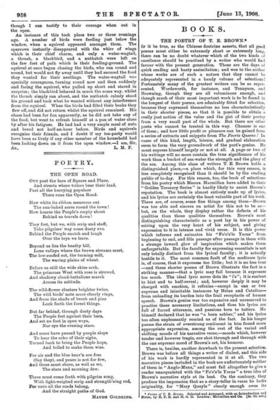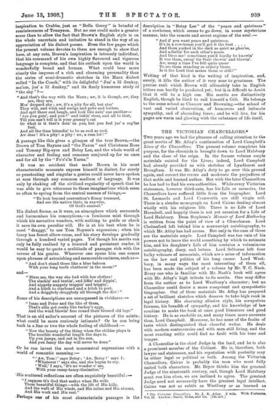BOOKS.
THE POETRY OF T. E. BROWN.*
IF it be true, as the Chinese doctrine asserts, that all good poems must either be extremely short or extremely long, there can be no doubt whatever which of the two kinds of excellence should be practised by a writer who would find favour with the present generation. These are the days of quick reading and hasty assimilation; and woe to the author whose works are of such a nature that they cannot be adequately represented in a bandy volume of selections! Fortunately many of the greatest writers can be so repre- sented. Wordsworth, for instance, and Tennyson, and Browning, though they are all voluminous enough, and though much of their most important work is to be found in the longest of their poems, are admirably fitted for selection, because they expressed themselves no less characteristically in their shorter pieces, so that it is possible to obtain a really just notion of the value and the gist of their poetry from a very small part of the whole. But there are other poets who cannot be treated in this way. Chaucer is one of them; and how little profit or pleasure can be gained from a series of extracts and snippets from The Faerie Queene ! In cases of this kind, length, leisure, and gradual elaboration seem to form the very groundwork of the poet's genius. He must express himself largely or not at all. A page or two of his writings will no more contain the true significance of his work than a bucket of sea-water the strength and the glory of the sea. Among this class of writers T. E. Brown holds a distinguished place,—a place which, for this very reason, is less completely recognised than it should be by the reading public of to-day. For this reason, too, the book of selections from his poetry which Messrs. Macmillan have added to their " Golden Treasury Series " is hardly likely to assist Brown's reputation. The book is almost entirely made up of lyrics, and his lyrics are certainly the least valuable part of his work. There are, of course, some fine things among them—Brown was too able and sincere an artist for this not to be so— but, on the whole, they display rather the defects of his qualities than those qualities themselves. Brown's most distinguishing characteristic as a poet lay in his power of seizing upon the very heart of his subject, and giving expression to it in intense and vivid verse. It is this power which informs and animates his "Fo'c's'le Yarns" from beginning to end, and fills passage after passage in them with a strange inward glow of inspiration which makes them unforgettable. But the faculty for expressing essentials is not only totally distinct from the lyrical faculty ; it is actually hostile to it. The most common fault of the mediocre lyric is, of course, that it expresses too little ; but it is no less true —and these shorter poems of Brown illustrate the fact in a striking manner—that a lyric may fail because it expresses too much. The ideal lyric never dots its " i's"; it is content to hint and to half-reveal ; and, however deeply it may be charged with emotion, it refrains—except in one or two supreme and inimitable instances by Heine and Catullus- from unloading its burden into the frail receptacle of human speech. Brown's genius was too expansive and unreserved to practise these necessary limitations, and thus his lyrics are full of forced utterance, and passions torn to tatters. He himself declared that he was "a born Bobber," and his lyrics too often unpleasantly remind us of the fact. In his longer poems the strain of overstrung sentiment in him found more appropriate expression, among the rest of the varied and shifting moods of his narrative verse,—moods which, however tender and however tragic, are shot through and through with the one supreme mood of Brown's art, his humour.
There is, besides, another drawback to the present selection. Brown was before all things a writer of dialect, and this side of his work is hardly represented in it at all. The two narrative pieces included in the book are unfortunately neither of them in " Anglo-Manx," and must fail altogether to give a reader unacquainted with the "Fo'c's'le Yarns " a true idea of Brown's narrative style at its best. On the contrary, they produce the impression that as a story-teller in verse he lacks originality, for "Mary Quayle" clearly enough owes its
• Pooms of T. E. Brown. Selected and Arranged, with an Introduction and Notes, by H. F. B. and H. G. D. London: Macmillan and Co. [110. 6d. net.]
inspiration to Crabbe, just as "Bella Gorry" is brimful of reminiscences of Tennyson. But no one could make a greater error than to allow the fact that Brown's English style is on the whole uncertain and imitative to stand in the way of an appreciation of his dialect poems. Even the few pages which
the present volume devotes to them are enough to show that here, at any rate, Brown's inspiration is intensely individual, that his command of his own highly flavoured and vigorous
language is complete, and that his outlook upon the world is wonderfully broad and human. What could bear more clearly the impress of a rich and charming personality than the series of semi-dramatic sketches in the Manx dialect called " In the Coach," with its delightful " Jus' a lil dunkey, ma'am, jus' a lil dunkey," and its finely humorous study of "the shy " ?—
" And that's the way with the Manx; aw, it is though, aw, they
are, they are, Mos' despard shy ; aw, it's a pity for all, but star' They will, and wink and nudge and poke and bother, And spit theer and laugh, and look like axin' one another- , Are you goin', and you ? ' and takin' rises, and all to that, Till you can't tell is it your granny's cat
Or what is it that's doin' on you, but you feel jus' a reg'lar
fool, And all the time bitendin' to be as cool as cool.
Aw dear ! it's a pity ! a pity ! aw, a rum lot ! "
A passage like this gives a glimpse of the true Brown,—the Brown of Tom Baynes and "the Pazon " and Christmas Rose and Tommy Big-eyes and Betsy Lee, and the whole world of character and feeling and romance conjured up for us once and for all by the " Fo'c's'le Yarns."
It was no accident that made Brown in his most characteristic moments express himself in dialect, for surely
so penetrating and singular a genius could never have spoken at ease through any common medium of language. It was only by shaking off the civilised regularity of speech that he was able to give utterance to those imaginations which seem so often to spring from the central essence of things,— " To look beyond convention's flimsy trammel, And see the native tints, in anywise,
Of God's enamel."
His dialect forms, as it were, an atmosphere which surrounds and harmonises his conceptions,—a luminous mist through
which his narrative wanders, with nothing to guide or check it save its own peculiar will. He is at his best when he is most " draggy," to use Tom Baynes's expression ; when his fancy has freest elbow-room, and his story develops gradually through a hundred varied pages. Yet though his merits can only be fully realised by a leisured and persistent reader, it
would be easy to quote a multitude of passages rich with the savour of his genius. Wherever one opens him one comes upon phrases of astonishing and memorable raciness, such as— "And don't stand there like a blue baboon
With your long teeth chatterin' in the moon!"
and- " Bless me, the way she had with her clothes ! The slackin' and tautin', and liffin' and dippin, And nippety-nappety trappin' and trippin', And a hitch to starboard and a hitch to port, And a driggledy-draggledy all through the dirt !"
Some of his descriptions are unsurpassed in vividness :— " Isaac and Peter and the like of them, That's allis got conks like turkey's eggs,
And the wind blowin' free round their blessed old legs."
That is an old sailor's account of the pictures of the saints ; what could be more curiously intimate ? Or he can bring back in a line or two the whole feeling of childhood:— "Now the beauty of the thing when the childer playa is
The terrible wonderful length the days is. Up you jumps, and out in the sun, And you fancy the day will never be done."
Or he can invest the most nonsensical expressions with a - world of romantic meaning :-
"' A.w, Tom !' says Betsy ; Aw, Betsy ! ' says I: *Whatever !' says she, and she begun to cry. ' Well,' I says, it's no wonder o' me, With your ransy-tansy-tissimitee "
His scattered reflections are often exquisitely beautiful "I suppose it's God that makes when He wills Them beautiful things—with the lift of His bills,
And the waft of His winds, and His calms and His storms, And His work and His rest."
.Perhaps one of his most characteristic passages is the description in "Betsy Lee" of the "peace and quietness" of a cowhouse, which seems to go down, in some mysterious manner, into the remote and secret regions of the soul :—
" And if you want peace and quietness,
It's in a cow-house you'll get it the best . . . . And them yooked in the dark as quiet as ghos'es, And a-feeliu' for each other's noses.
And bless me ! sometimes you'd hardly be knowin' It was them, excep' for their chewin' and blowin'. Aw, many a time I've felt quite queer To see them standing so orderly there. Is it the Lord that makes them so still?"
Writing of that kind is the writing of inspiration, and, surely, it lifts the author• of it very near to greatness. The
precise rank which Brown will ultimately take in English letters can hardly be predicted yet ; but it is difficult to doubt that it will be a high one. His merits are distinctively English, though he liked to call himself a Celt. He belongs to the same school as Chaucer and Browning,—the school of vast and varied observation, of humorous and intimate sympathy, and of abounding force ; and he will live, for his pages are warm and glowing with the substance of life itself.







































 Previous page
Previous page